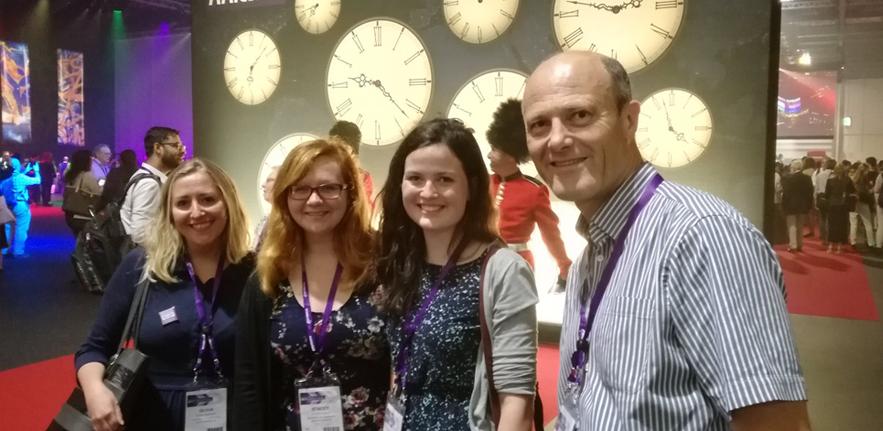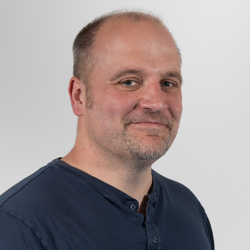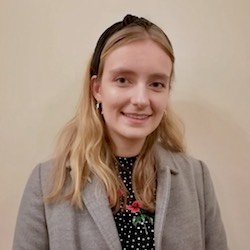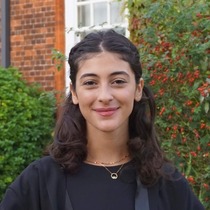
Professor Michael Coleman

Michael graduated from Oxford with a first in Biochemistry and did his PhD in London on neurofilament biochemistry. He returned to Oxford for two postdocs, the first on the molecular genetics of human eye diseases and the second identifying the slow Wallerian degeneration gene (WldS) in mice, working with Hugh Perry, Laura Conforti and colleagues. Much of the group’s subsequent research at the University of Cologne, Babraham Institute and now at the University of Cambridge has built on this discovery as well as branching into related areas of axon and synapse degeneration. Since 2016, Michael has been Academic Lead of the John van Geest Centre for Brain Repair in Cambridge.
In his ‘spare’ time he is an incorrigible long-distance cyclist.
Twitter: @M_P_Coleman
Dr Jonathan Gilley

Jonathan did a BSc in Human Sciences at University College, London before completing his PhD on comparative genomics in Mike Fried’s group at the Imperial Cancer Research Fund, London (subsequently Cancer Research UK). After doing a postdoc studying developmental neuronal cell death in Jon Ham’s group at the Institute of Child Health, London, Jon joined Michael at the Babraham Institute, Cambridge where he started investigating the molecular mechanisms involved in axon degeneration after injury and in disease. Since 2016 Jon has continued this research as a Senior Research Associate within the Coleman group at the John van Geest Centre for Brain Repair, University of Cambridge.
Dr Christina Antoniou

Christina graduated from the University of Edinburgh with a first class degree in Biomedical Sciences with Honours in Neuroscience. For her final year she completed a project on synaptic vesicle recycling, focusing on the molecular control of Synaptotagmin-1 retrieval during endocytosis. She joined the Coleman lab in 2018 as a Masters student investigating the roles of SARM1 in viral and inflammatory neuropathies.
In her spare time, Christina enjoys travelling, baking and reading.
Ella Hopkins

Ella Hopkins received a first-class degree in Molecular Biology from the University of Sheffield before going on to complete an MRes degree at University College London in Biosciences. Her Master’s project in the MRC Laboratory for Molecular Cell Biology focussed on the role of the chemokine CCL3 in in vitro Schwann cell chemotaxis. She has joined us as a Research Assistant working with Jon Gilley on the mechanism and regulation of SARM1.
Elisa Merlini

Elisa Merlini recently graduated from King’s College London with a first-class degree (Hons) in Neuroscience. Before joining the Coleman Lab, she completed her final-year dissertation project regarding the effects of long-term Chondroitinase ABC treatment on spinal cord injury in rat models. She has joined the Coleman Lab as an M Phil student to work with Andrea Loreto investigating the relationship between toxins such as rotenone and Wallerian degeneration pathways associated with Parkinson’s disease. She has already put us all in our place at ten pin bowling!
Dr Emma Wilson
Emma Wilson completed a BSc in Biomedical Sciences and a PhD in Neuroscience from University College London. During her PhD she worked on the cellular pathomechanisms underlying Hereditary Sensory Neuropathy type I supervised by Professor Linda Greensmith, Professor Mary M. Reilly, and Dr Bernadett Kalmar. After her PhD, Emma moved to Buffalo, New York for post-doctoral training with Professor M. Laura Feltri, where she explored the roles of the prohibitin proteins in myelination. In 2021, she joined the Coleman lab as a post doctoral research associate, where her project focuses on the genetic regulation of SARM1 and NMNAT2 expression and the role this may have in human disease.
After living in the US, Emma married her life-long support of Queens Park Rangers FC with becoming an avid Buffalo Bills fan.
Anna Vlachaki
Anna graduated with a first-class degree in Biochemistry from University College London, where she acquired a passion for neurodegeneration, ageing, and structural biology. Following a year of working in industry, Anna completed an MPhil in Biochemistry in the University of Cambridge, studying DNA replication and the interplay between DNA secondary structures and DNA replication initiation. Anna joined the Coleman lab as a PhD student to investigate the role of SARM1 in human neurodegenerative disorders.
Outside of the lab, Anna loves music and musical theatre, dancing, baking, and science fiction.
Coleman group alumni
- Laura Conforti (1995-1999 Oxford; 1999-2001 Cologne; and 2003-2010 Babraham)
https://www.linkedin.com/in/laura-conforti-b1b2aa30/
- Till Mack (1999-2002 Cologne)
linkedin.com/in/till-mack-2182921b
- Diana Wagner-Stippich (1999-2003 Cologne)
linkedin.com/in/wagner-stippich-diana-57b39284
https://www.researchgate.net/profile/Diana_Wagner-Stippich https://www.sf.mpg.de/person/52451/1837529
- Weiqian Mi (1999-2003 Cologne)
https://www.researchgate.net/scientific-contributions/39306879_Weiqian_Mi
Now working for Nutricia Advanced Medical Nutrition, Danone Research, Wageningen, The Netherlands
- Bogdan Beirowski (2000-2003 Cologne; 2005-2009 Babraham)
linkedin.com/in/bogdan-beirowski-0b429536
- Heike Laser (2002-2004 Cologne)
- Daniela Grumme (2002-2003 Cologne)
https://www.researchgate.net/scientific-contributions/38168673_Daniela_S_Grumme
Now working at http://immih.uk-koeln.de/forschung/ag-kroenke
- Livia Adalbert (2002-2003 Cologne)
linkedin.com/in/livia-adalbert-7ab40376
- Katherine Bowen (née Bridge) (2003-2006 Babraham)
linkedin.com/in/katherine-bowen-5346675
- Anna Wilbrey-Clark (2005-2008 Babraham)
linkedin.com/in/anna-wilbrey-0ba32530
Now at Human Cell Atlas Project, Wellcome Trust Sanger Institute
- Elisabetta Babetto (2005-2009 Babraham)
linkedin.com/in/elisabettababetto
- Giacomo Morreale (2006-2008)
- Lucie Janeckova (2006-2011 Babraham)
linkedin.com/in/luciejaneckova
- Catherine Evans (2007-2009 Babraham)
linkedin.com/in/catherine-evans-7433519
- Stefan Milde (2009-2014 Babraham)
linkedin.com/in/stefan-milde-8435a130
- Jane Patrick (2011-2012 Babraham)
linkedin.com/in/jane-patrick-aa1b05105
- Isabelle Nascimento Ferreira (2011-2012 Babraham)
linkedin.com/in/isabel-nascimento-ferreira-8a322510
- Katharina Godzik (2010-2014 Babraham)
linkedin.com/in/dr-katharina-godzik-77918962
- Adam Knight (2012-2015 Babraham)
linkedin.com/in/adam-knight-b3822a40
- Christy Hung (2013-2016 Babraham)
linkedin.com/in/christy-hung-464ba66a
- Jemeen Sreedharan (2012-2017 Babraham)
linkedin.com/in/jemeen-sreedharan-677905146
- Matt White (2014-2017 Babraham)
- Ziqiang (Selina) Lin (2016-2017 Babraham)
- Francesca Massenzio (2016-2017 Babraham)
linkedin.com/in/francesca-massenzio
- Ciaran Hill (2013-2017 Babraham and Cambridge)
- Xiuna (Nina) Yang (2016-2018 Cambridge)
- Maria Martinez-Fresno (2016-2018 Cambridge)
- Dr Claire Durrant (née Harwell) (2012 -2019 Babraham & Cambridge)
Claire graduated with a first class degree in Natural Sciences from the University of Cambridge. For her final year, she specialised in neuroscience, completing a research project on enhancing autophagy as a potential treatment for tauopathy. She joined the Coleman lab in 2013 as a PhD student, where she developed an organotypic hippocampal slice culture model of Alzheimer’s disease. After completing her PhD in 2016, Claire expanded on this work as a postdoc, focussing on the causes and consequences of synapse damage in Alzheimer’s disease. Claire left the Coleman lab in 2019 to undertake a fellowship position at the University of Edinburgh. Twitter: @ClaireDurrant1
- Dr Romina Vuono (2017-2019 Cambridge)
Romina did Biological Science at University of Calabria (Italy) and specialized in Molecular Biology in 2001. She then gained a MSc in Biotechnology in 2005 and a PhD in Molecular Pathology in 2009 at the same University. Her PhD work was focused on understanding the molecular mechanism of two novel tau mutations found in a patient with Frontotemporal dementia. Following this, she moved at the University of Cambridge and joined the groups of MG Spillantini (Feb 2010 – Sept 2010) as a chief research assistant and R Barker (Oct 2010 – May 2017) as a Postdoc research associate. During this time, she has been involved on two main projects: 1) sleep and circadian rhythm regulation in Parkinson’s disease; 2) novel role of tau in the pathogenic process and clinical expression of Huntington’s disease. She has also done much work on embryonic stem cell differentiation.
- Raquel Conceicao (2019 Cambridge)
Raquel completed her Biomedical Sciences in Histocellular Pathology degree at the Escola Superior de Tecnologia de Saude de Lisboa, in Portugal. In 2017, she specialised in Clinical Neurosciences for her MPhil at the University of Cambridge while working as Research Assistant in Prof. Keith Martin’s group. Her MPhil project was focused on regenerative medicine for glaucomatous optic neuropathy. Raquel worked at the Coleman lab in 2019 as a Research Assistant.
- Rachael Eiting (2018-2019 Cambridge)
Rachael received her BA English Literature degree from the University of Wisconsin-Oshkosh and is currently pursuing an Advanced Diploma in Research Theory from the Cambridge University Institute of Continuing Education. She is researching instances of Othering in first person narration and the effects of othering on character development. She hopes to pursue this line of enquiry through a graduate degree investigating narrative fiction's relationship to empathy development in adolescence. She has worked part time in administration and reception in the Department of Psychiatry at Douglas House before coming to the Coleman Lab as group administrator and PA to Professor Michael Coleman.
- Dr Robert Adalbert (2002-2020 Babraham and Cambridge)
Robert graduated in Veterinary Medicine at the University of Agricultural Sciences and Veterinary Medicine, Cluj-Napoca, Romania and obtained his PhD degree in Neuroscience from the University of Szeged, Hungary. He joined the Coleman lab in 2002 and since then Robert has conducted postdoctoral research projects on motor neuron disease (ALS), slow Wallerian degeneration (WldS), Alzheimer’s disease and ageing, first at the University of Cologne, and later at the Babraham Institute, Cambridge. His research at the John van Geest Centre for Brain Repair, University of Cambridge focused on mechanisms of axon degeneration and protection in chemotherapy-induced neuropathy and testing modifiers of axonal transport.
- Dr Stacey Gould (2014-2021 Cambridge)
Stacey graduated from the University of Manchester with a first class (Hons) in Neuroscience. During her Undergraduate degree, she spent one year in Germany working for Pharmaceutical company Boehringer Ingelheim on a way to better predict how pain medications will work in patients with chronic pain. She joined the Coleman lab in 2014 as a Research Assistant studying Wallerian degeneration as a potential cause of chemotherapy-induced peripheral neuropathy before becoming a PhD student in 2015. For her PhD, Stacey studied the Wallerian degeneration pathway and worked on developing a way to screen thousands of molecules for drugs that might prevent this pathway causing axons to degenerate after injury. Stacey moved on to another position within the University of Cambridge, as a Research Associate in the Department of Psychology.
- Oscar Jackson (2021-2022 Cambridge)
Oscar Jackson graduated in 2019 from Imperial College London with a BSc in Biology, specialised towards molecular biology and immunology. Subsequently, he attained an MSc with Distinction in Molecular Medicine at the University of York. His Master's research project involved analysing single cell RNA sequencing datasets to investigate the effect of type 2 cytokine signalling on hematopoietic stem cell development. Oscar's work with us focused on the mechanism of action and regulation of SARM1. Oscar went on to start his PhD at the University of Edinburgh in 2022.
- Dr Mirlinda Ademi (2019-2023 Cambridge)
Mirlinda graduated with distinction from the Medical University of Vienna. In her studies she juggled between her interest in basic research and her medical education. Before moving to Cambridge, Mirlinda worked as a diploma student investigating the role of malondialdehyde in macrophage migration and non-apoptotic cell death at CeMM Vienna. Her interest in neurophysiology and molecular mechanisms resulting in neurological pathologies motivated her to join the Coleman Group for her PhD. Her PhD project explored how gene variants influence axon vulnerability in human disease.
- Dr Peter Arthur-Farraj (2015-2023 Cambridge)
Peter completed a medical degree, intercalated BSc and PhD in Neuroscience at University College London in 2011. During his PhD, he studied the role of the Schwann cell in nerve injury and repair. Alongside postgraduate medical training he held two clinical academic positions, first at Imperial (2011-2013) and the second an Academic Clinical Fellowship at Cambridge (2013-2015). During this time, he worked part-time in Tim Aitman’s lab in Imperial College London, utilising next generation sequencing, to identify epigenetic regulators of Schwann cells in nerve injury. In 2015 he started Neurology specialty training in Cambridge, which is currently ongoing. He was awarded a Clinical Research Career Development Fellowship from the Wellcome Trust to work with Michael Coleman in the John van Geest Centre for Brain Repair, studying Schwann cell-axonal interactions during nerve injury and disease. Twitter: @DoctorPAF
- Dr Clara Mutschler (2019-2023 Cambridge)
Clara Mutschler graduated from the University of Aberdeen with a first-class Honours degree in Neuroscience with Psychology. During her final year she completed a project investigating the mechanisms underlying axon guidance and regeneration in the central nervous system, specifically focusing on the role of cAMP and its downstream effectors. She joined Peter Arthur-Farraj in the Coleman Lab as a PhD student investigating the role of Neuron-Schwann cell interactions in peripheral nerve repair.
- Dr Andrea Loreto (2017-2023 Cambridge)
Andrea completed his BSc in Biotechnology and his MSc in Medical and Pharmaceutical Biotechnology at the University of Florence in 2012. He then moved to Nottingham to join the Conforti lab as a PhD student in 2013, focusing on mechanisms of injury-induced axon degeneration. Having completed his PhD at the end of 2016, Andrea joined the Coleman lab to work on axon death following mitochondrial dysfunction. In 2018, he was awarded a Sir Henry Wellcome postdoctoral fellowship from the Wellcome Trust to study the link between the Wallerian pathway and Parkinson’s disease. Twitter: @Andrea_Loreto1
- Dr Robert Humphrey
Robert (‘Bobby’) Humphrey completed his combined Bachelor’s and Master’s MSci degree at the University of Nottingham, graduating with first-class honours in 2019. As part of his studies he undertook a 12-month industrial studentship at Janssen Pharmeceutica (Beerse, Belgium), where he used field potential recording techniques to investigate the consequences of ageing on synapse function in the hippocampus. Bobby completed his PhD at the Coleman Lab, developing methods to investigate the functional consequences of Alzheimer’s disease pathology on synaptic connections.
- Dr Olivia Sheppard (2017-2024 Cambridge)
Olivia completed her BS in Biology at Penn State University and MSc in Biomedical Sciences Research at King’s College London. Her project at KCL involved studying the effects of flavonoids on AMPA receptor units with Dr Robert Williams. Following this she took up a research associate role in the Department of Cardiology at KCL, but soon returned to Neuroscience when she began working with Prof. Elizabeth Fisher at the Institute of Neurology, University College London. During her years at the ION, she worked on the increased incidence of Alzheimer’s disease in people with Down Syndrome. She joined the Coleman lab in February 2017 where she completed her PhD. Her work involved using organotypic hippocampal slice cultures as a tool to study Alzheimer’s disease.
- Louise Massara (2020-2024 Cambridge)
Louise Massara graduated from the University of Edinburgh with an MA (Hons) in History and English Literature and, as a mature student, completed a Master’s degree in Historical Research at Birkbeck, University of London. Louise was the Coleman Lab's administrator from 2020 to 2024.


